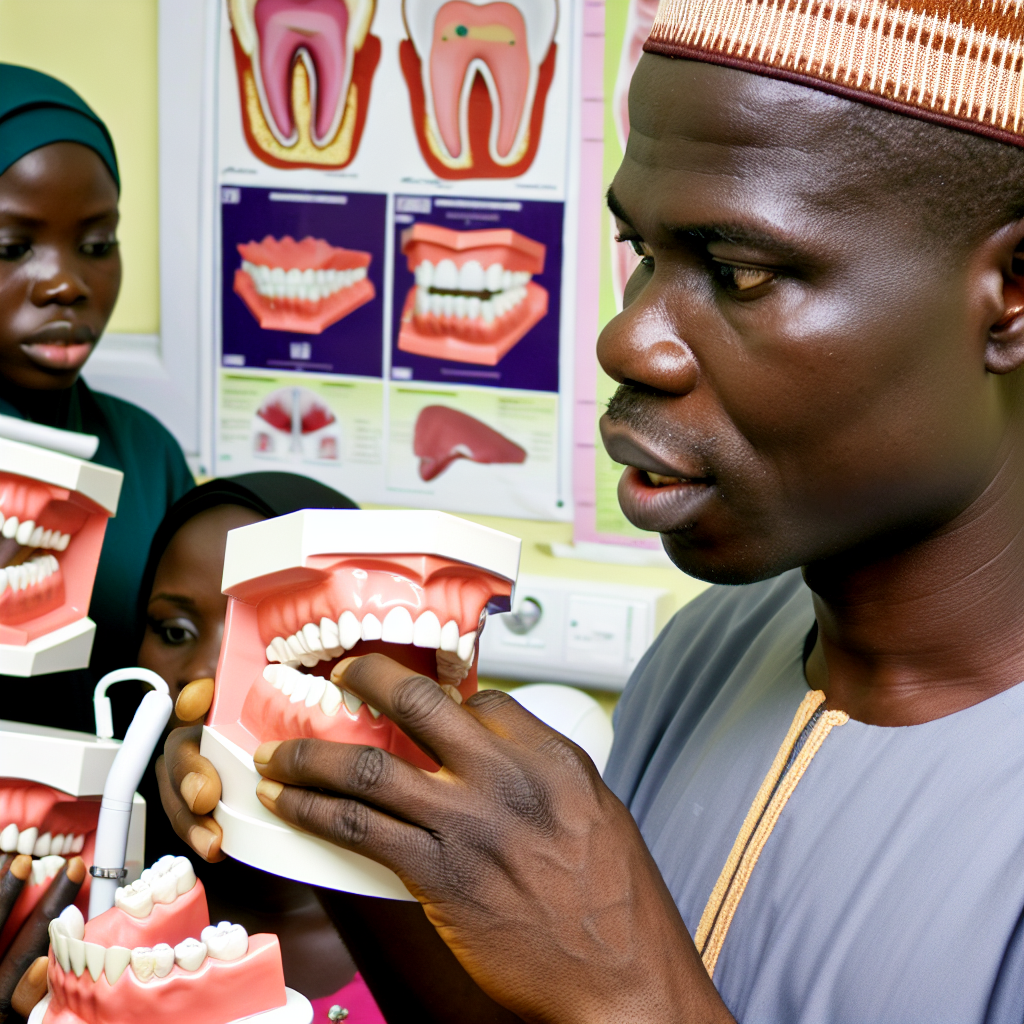Introduction:
Tobacco use is a prevalent issue in Nigeria.
This high number of individuals uses various tobacco products.
The widespread use of tobacco has significant consequences on oral health.
It includes an increased risk of oral cancer, gum disease, and tooth loss.
The link between tobacco use and oral cancer in Nigeria:
There is a strong connection between tobacco use and oral cancer, especially in Nigeria.
Research has shown that individuals who smoke or use tobacco products are at a higher risk of developing oral cancer compared to non-users.
The harmful chemicals in tobacco not only affect the lungs but also have detrimental effects on oral health.
According to recent studies, a significant number of oral cancer cases in Nigeria are directly linked to tobacco use.
The rates of oral cancer have been on the rise, with a noticeable increase in individuals who are regular smokers or consumers of smokeless tobacco products.
It is clear that the prevalence of oral cancer is closely tied to tobacco consumption habits.
Statistics on oral cancer cases related to tobacco use in Nigeria:
- From a survey conducted in major cities across Nigeria, it was found that over 70% of oral cancer patients were tobacco users.
- Among the tobacco users diagnosed with oral cancer, more than half were habitual smokers, while the rest were users of smokeless tobacco.
- The mortality rate among oral cancer patients who were tobacco users was significantly higher compared to non-tobacco users.
Risk factors associated with developing oral cancer due to tobacco use:
- Tobacco smoke contains carcinogens that can damage the cells in the oral cavity, leading to the formation of cancerous lesions.
- Smokeless tobacco products, such as snuff or chewing tobacco, can also increase the risk of oral cancer due to prolonged exposure to harmful chemicals.
- Combining tobacco use with heavy alcohol consumption further escalates the risk of developing oral cancer, as both substances have synergistic effects on cell mutations.
It is crucial for individuals in Nigeria to be aware of the dangers of tobacco use on oral health and the increased risk of developing oral cancer.
Prevention is key, and quitting tobacco in any form can significantly reduce the chances of developing this life-threatening disease.
Early detection through regular dental check-ups is also essential for timely intervention and treatment of oral cancer.
The effect of tobacco on gum disease in Nigeria:
When it comes to oral health in Nigeria, the impact of tobacco on gum disease cannot be ignored.
Tobacco use is a significant risk factor for the development and progression of gum disease, also known as periodontal disease.
How tobacco contributes to the development of gum disease:
- Tobacco use, whether through smoking or chewing tobacco, can weaken the immune system, making it harder for the body to fight off infections in the gums.
- Nicotine and other chemicals in tobacco products can reduce blood flow to the gums, impairing their ability to heal and recover from damage.
- The sticky residue left behind by tobacco products can attract bacteria, leading to plaque buildup and inflammation in the gums.
Symptoms and consequences of gum disease caused by tobacco use:
- Individuals who use tobacco may experience symptoms such as red, swollen, and bleeding gums, persistent bad breath, and loose or shifting teeth.
- Untreated gum disease can progress to more severe conditions, including tooth loss, gum recession, and even damage to the underlying bone supporting the teeth.
- Chronic gum disease has also been linked to systemic health issues like heart disease, diabetes, and respiratory infections.
Potential treatments and preventive measures for gum disease in tobacco users:
- Regular dental cleanings and check-ups are essential for individuals who use tobacco to monitor their gum health and address any early signs of disease.
- Quitting tobacco use is the most effective way to prevent and reverse the effects of gum disease. Smoking cessation programs and support groups can help individuals kick the habit.
- Professional treatments for gum disease caused by tobacco use may include scaling and root planing, antibiotics, and in severe cases, surgical intervention to restore gum health.
- Maintaining good oral hygiene practices, such as brushing twice a day, flossing regularly, and using an antiseptic mouthwash, can help reduce the risk of gum disease in tobacco users.
You Might Also Like: Role of Biomedical Technology in Nigerian Surgery
When it comes to oral health, tobacco use can have a significant impact on the overall hygiene practices of individuals in Nigeria.
Here, we will explore how tobacco can negatively affect oral hygiene.
We will also discuss the challenges faced by tobacco users in maintaining good oral health.
Finally, we will provide tips for improving oral hygiene despite tobacco use.
Effects of Tobacco on Oral Hygiene
- Tobacco use can lead to bad breath and stained teeth, affecting overall oral hygiene.
- It increases the risk of gum disease, tooth decay, and oral cancer.
- Smoking can also slow down the healing process after dental procedures.
Challenges Faced by Tobacco Users
- Tobacco users may experience dry mouth, which can lead to bad breath and an increased risk of cavities.
- The habit of smoking can cause a buildup of plaque and tartar on teeth and gums.
- Smokers may also have a weakened immune system, making it harder to fight off oral infections.
Tips for Improving Oral Hygiene Despite Tobacco Use
- Quit smoking or using tobacco products to improve overall oral health.
- Brush teeth at least twice a day and floss daily to remove plaque buildup.
- Use fluoride toothpaste and mouthwash to strengthen teeth and prevent cavities.
- Visit the dentist regularly for check-ups and professional cleanings.
- Stay hydrated by drinking plenty of water to combat dry mouth.
- Limit sugary and acidic foods and beverages that can damage teeth and gums.
By being aware of the negative effects of tobacco on oral hygiene, individuals in Nigeria can mitigate the risks associated with tobacco use.
Taking proactive steps to maintain good oral health will help them enjoy a healthier smile.
Gain More Insights: Innovations in Nigerian Medical Microbiology
Dental complications associated with tobacco use in Nigeria:
Common dental issues:
- Tooth discoloration
- Bad breath
- Gum disease
- Oral cancer
- Tooth decay
Long-term effects of tobacco on oral health:
- Tooth decay: Tobacco use can lead to the formation of cavities.
- Tooth loss: Smoking increases the risk of tooth loss due to gum disease.
- Gum disease: Tobacco use weakens the immune system, making gums more susceptible to infections.
- Oral cancer: Tobacco is a major risk factor for oral cancer.
- Delayed healing: Smokers have slower healing times after dental procedures.
Treatment options for dental complications:
- Regular dental check-ups: Routine visits to the dentist can help catch issues early.
- Professional cleaning: Scaling and polishing can remove stains caused by tobacco.
- Gum treatments: Periodontal therapy may be needed to treat gum disease.
- Fillings and crowns: Cavities and damage from tobacco use can be fixed with dental restorations.
- Quit smoking programs: Support to help individuals quit tobacco use for better oral health.
Tobacco use in Nigeria has a significant impact on oral health, leading to various dental complications.
Both smoking and smokeless tobacco products can cause harm to the teeth, gums, and overall oral cavity.
It is important to understand the potential risks associated with tobacco use and the importance of maintaining good oral hygiene practices.
One of the most common dental issues that arise from tobacco use is tooth discoloration.
The nicotine and tar in tobacco products can stain the enamel of the teeth, leading to yellow or brown discoloration that is difficult to remove with regular brushing.
This can affect an individual’s confidence and self-esteem.
Another prevalent problem is bad breath, also known as halitosis.
Tobacco use can cause a lingering smell in the mouth due to the chemicals present in cigarettes and other tobacco products.
This can be off-putting in social situations and can be a sign of poor oral health.
In addition to these cosmetic concerns, tobacco use can have serious long-term effects on oral health.
One of the most significant risks is tooth decay, commonly known as cavities.
The sugars and acids in tobacco products can erode the enamel of the teeth, leading to decay and cavities that require dental fillings to repair.
Furthermore, smoking increases the risk of gum disease, a serious infection of the gums that can lead to tooth loss if left untreated.
Tobacco weakens the immune system, making it harder for the body to fight off bacteria that cause gum disease.
Transform Your Career with Expert Guidance
Get personalized mentorship consulting that’s tailored to your unique path. Our expert advice is actionable and exclusive.
Get StartedThis can result in red, swollen, and bleeding gums that eventually recede and can no longer support the teeth.
Oral cancer is another major concern for individuals who use tobacco products.
Smoking and smokeless tobacco can expose the soft tissues of the mouth to harmful chemicals that can lead to the development of cancerous lesions.
Early detection and treatment are essential to improving outcomes in oral cancer cases.
Moreover, tobacco use can also delay healing after dental procedures such as extractions or oral surgeries.
Smoking restricts blood flow in the mouth, slowing down the body’s ability to repair damaged tissues.
This can prolong recovery time and increase the risk of complications following dental treatments.
Fortunately, there are treatment options available for individuals experiencing dental complications due to tobacco use.
Regular dental check-ups are essential for monitoring oral health and catching issues early.
Professional cleaning procedures like scaling and polishing can remove stains and tartar buildup caused by tobacco.
For individuals with gum disease, periodontal therapy may be necessary to deep clean the pockets around the teeth and reduce inflammation.
Fillings and crowns can repair cavities and restore damaged teeth to their proper function.
Quit smoking programs and support groups can also help individuals kick the habit and improve their oral health outcomes.
Learn More: Developing Soft Skills for Nigerian Medical Practitioners

Impact of Tobacco on Oral Health in Nigeria
The economic burden of tobacco on oral health in Nigeria is significant.
The financial costs associated with treating tobacco-related oral health problems cannot be overlooked.
Financial Costs of Treating Tobacco-Related Oral Health Problems
- The cost of treating oral diseases caused by tobacco use can be exorbitant, putting a strain on individuals, families, and the healthcare system.
- From dental visits to surgeries and other procedures, the expenses incurred in managing tobacco-related oral health issues are substantial.
- Patients often have to bear the financial responsibility of seeking treatment for conditions such as periodontal disease, oral cancer, and tooth decay.
- These costs can escalate over time as the progression of tobacco-related oral health problems may require extensive interventions and long-term care.
Impact on the Healthcare System
- The burden of tobacco-related oral health issues extends beyond individual costs and affects the healthcare system as a whole.
- Healthcare facilities and professionals in Nigeria are overwhelmed by the increased demand for oral health services due to tobacco use.
- Resources that could have been allocated to other critical areas of healthcare are diverted to address the consequences of tobacco-related oral diseases.
- The strain on the healthcare system impacts overall efficiency, waiting times for treatment, and the quality of care provided to patients with tobacco-related oral health problems.
Potential Strategies for Reducing Economic Burden
- Implementing tobacco control policies and regulations that discourage smoking and reduce the prevalence of tobacco use can help mitigate the economic burden on oral health.
- Increasing public awareness campaigns about the link between tobacco use and oral health can empower individuals to make informed decisions and prevent oral diseases.
- Offering affordable and accessible oral health services, including preventive care and early intervention, can help reduce the long-term costs associated with treating tobacco-related oral health problems.
- Collaborating with stakeholders across different sectors to develop comprehensive strategies for tobacco cessation and oral health promotion can lead to significant cost savings in the long run.
The economic burden of tobacco-related oral health issues in Nigeria is substantial and has far-reaching implications for individuals and the healthcare system.
By implementing targeted strategies to reduce tobacco use and improve oral health outcomes, we can alleviate the financial strain and improve the overall well-being of the population.
Learn More: Radiography Program Accreditation in Nigeria
Public Health Interventions to Address Tobacco Use and Its Impact on Oral Health in Nigeria
– Highlight existing tobacco control measures in Nigeria
– Discuss the effectiveness of public health campaigns focused on reducing tobacco use and promoting oral health
– Suggest potential policy changes or interventions to further address the impact of tobacco on oral health in the country
Existing Tobacco Control Measures in Nigeria:
In Nigeria, several tobacco control measures have been implemented to curb the use of tobacco products. These measures include:
- Smoke-Free Policies: The government has introduced smoke-free policies in public places to reduce exposure to secondhand smoke.
- Advertising Bans: Restrictions on the advertising and promotion of tobacco products have been put in place to prevent the marketing of these products to vulnerable populations.
- Health Warnings: Graphic health warnings on tobacco packaging serve as a deterrent to potential users by highlighting the negative health effects of tobacco consumption.
- Taxation: Increasing taxes on tobacco products has been an effective strategy to discourage consumption and generate revenue for public health initiatives.
Effectiveness of Public Health Campaigns:
Public health campaigns in Nigeria have played a crucial role in raising awareness about the dangers of tobacco use and promoting oral health. These campaigns have been effective in:
- Increasing Knowledge: Public health campaigns have educated the public about the risks associated with tobacco use, including its impact on oral health.
- Behavior Change: By encouraging individuals to quit smoking or never start, public health campaigns have helped reduce tobacco use rates in the country.
- Support Services: Campaigns have also highlighted the availability of support services, such as quitlines and counseling, for those looking to quit tobacco use.
- Community Engagement: Engaging with local communities to spread health messages has increased the reach and impact of public health campaigns.
Potential Policy Changes and Interventions:
While progress has been made in addressing the impact of tobacco on oral health in Nigeria, there are still areas that require attention. Some potential policy changes and interventions to further address this issue include:
- Stricter Enforcement: Enhancing the enforcement of existing tobacco control laws can help reduce the availability and accessibility of tobacco products.
- Education and Awareness: Investing in educational programs and campaigns to increase awareness about the harms of tobacco on oral health can help prevent initiation and encourage cessation.
- Integration of Services: Integrating oral health services with existing tobacco cessation programs can provide comprehensive support to individuals looking to quit tobacco use.
- Research and Surveillance: Continued research and surveillance on tobacco use and its impact on oral health will help inform evidence-based policies and interventions.
By prioritizing public health interventions and policy changes, Nigeria can work towards improving oral health outcomes and reducing the burden of tobacco-related diseases in the population.
Impact of Tobacco on Oral Health in Nigeria
The impact of tobacco on oral health in Nigeria is significant.
Tobacco use can lead to oral cancer, gum disease, and tooth loss.
Raising awareness about the harmful effects of tobacco on oral health is crucial.
It is important for individuals to understand the risks associated with smoking and chewing tobacco.
By taking steps to improve oral hygiene, such as regular brushing and flossing, individuals can maintain better overall well-being.
It is essential to prioritize oral health and make informed choices.
Taking action can prevent the negative consequences of tobacco on oral health in Nigeria.
Let’s all work together to create a healthier society.
Additional Resources
Oral health of adolescents in West Africa: prioritizing its social …
Olufemi Erinoso | School of Community Health Science | University …




